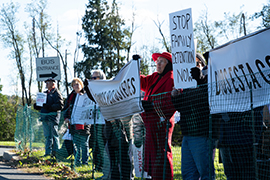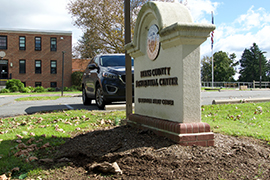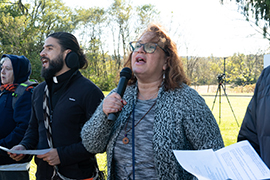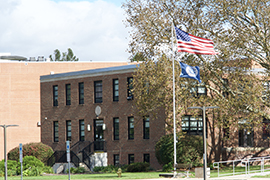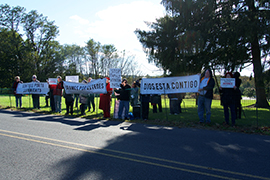- Slug:BC-CNS-Family Detention,1160
- 5 photos, video story available (thumbnails, captions below)
By RENATA CLÓ
Cronkite News
READING, Pa. — Even though she spent 19 months in detention after crossing the border and seeking asylum in the U.S. in 2015, Salvadoran Karen Zelaya was still able to celebrate her son’s sixth and seventh birthdays with him.
They were not the happiest of birthdays.
Zelaya and her son, Steven Albanes, were being held together with dozens of other families at the Berks Family Residential Center in Pennsylvania, one of just three family detention centers in the U.S. and the only one run by a local government.
“For his second birthday (in the center), by 2017, he told me that if he wasn’t free on his birthday that he would jump out of our room’s window,” said Zelaya, who said her son twice threatened to kill himself while they were at Berks.
“I told him, ‘My love, you will get hurt,'” she said in Spanish. “‘I know I will get hurt,’ he told me.”
Protesters in this eastern Pennsylvania community gather for regular vigils outside the 96-bed facility, singing and praying in Spanish and English and calling on state and local officials to shut it down.
“We’ve had suicidal kids, we’ve had a rape. We’ve had people detained for two years while suffering both medical and psychological trauma,” said Bridget Cambria, a lawyer at a nonprofit that works with Berks residents. “We’ve had kids that when they’re released from the facility never escape the stress they have suffered.”
But Immigration and Customs Enforcement officials say they have a “zero tolerance” policy for sexual abuse or assault in detention centers like Berks, where detainees are encouraged to file complaints and staffers are trained in how to handle them.
A statement from ICE paints a very different picture of Berks, which it described as “an effective and humane alternative to maintain family unity as families await the outcome of immigration hearings or return to their home countries.”
It said Berks, a converted nursing home, provides playrooms, a gym, educational services, social workers and medical care, and access to legal counsel among other benefits. The agency said Berks even has a recreational coordinator who helps organize events at the center and field trips for the children.
Far from wanting to close it down, the Department of Homeland Security is considering plans to open more family detention centers.
DHS and the Department of Health and Human Services in September proposed a change to current rules that would let the federal government license such facilities, instead of the currently required state licensing.
State licensing “is problematic,” DHS said, because states typically don’t have facilities to hold minors and parents together. Having federally licensed facilities to hold families would let the government provide the same “materially identical assurances about the conditions of such facilities” that courts require.
The three current family residential centers in the U.S. have a total of 3,326 beds at a cost of about $289 million a year from 2015 to 2017.
DHS said it wants to expand the number of such centers to prevent “a powerful incentive for adults to bring juveniles on the dangerous journey to the United States and then put them in further danger by illegally crossing the United States border.”
That incentive, according to the government, is a 1997 court order, the so-called Flores settlement, that requires the government to place minors in immigration cases “in the least restrictive setting” for the least amount of time possible.
In many cases, releasing a child from custody will require the release of the parent, leading immigrants to hope, “whether correct or not, that having a juvenile will result in immediate release,” the DHS said.
That’s not what Zelaya was thinking when she showed up at the border in Piedras Negras, Texas, in August 2015 with her son, then 5, and asked for asylum. She said she left El Salvador after witnessing gang members commit a crime.
“It wasn’t a murder, but I believe they felt threatened,” so they told her to go away and not say anything, said Zelaya, now back in El Salvador but living in a different town. That’s when she decided to leave for the U.S. with her son.
Asylum seekers who claim they are afraid to return to their home countries first get a “credible fear” hearing to review their claim. If they pass the interview, they are released on parole to await a fuller court hearing on their claim, said Adriana Zambrano, a volunteer at Aldea, the same organization where Cambria works.
“After they get released, that doesn’t mean that they have won asylum,” Zambrano said. “That means that they have won the opportunity to get in front of an immigration judge, and conduct regular immigration proceedings.”
Zelaya and her son were held in Texas for two months, then transferred to Berks while their asylum claim was processed. After their claims were rejected, however, Zambrano and 27 other mothers went to court to challenge the denial, extending their stay at Berks well beyond the 20 days most people are held there.
“They had lost their hearing … so they had to stay in detention while they were arguing that they had a right to go to federal court,” said Lee Gelernt, an American Civil Liberties Union attorney who argued their case in federal court.
But pressing their legal claim meant staying at Berks.
“Detention alone is inherently damaging to children, just any form of confinement is bad for children,” Zambrano said. “But if you add that to the Flores proposed regulations, the results would be dismal.”
But ICE says that while Berks is a fenced, secure facility that detainees are not allowed to leave, they are free to move about certain areas within the facility. There are no “secure doors” in the residential areas of the facility, which is decorated with “colorful murals and pictures,” the agency said.
Requests to tour the facility were not returned.
Pennsylvania Gov. Tom Wolf has tried to revoke the facility’s license, said spokesman J.J. Abbott, and has urged the Trump administration to close Berks. But it’s a county facility run on contract with the federal government, so there is only so much the state can do, Abbott said.
The state could issue an emergency removal order if it found “misconduct that causes immediate and serious danger to the life and health of the children,” he said. But the Pennsylvania Department of Human Services “conducts regular unannounced inspections and has not found grounds” to close the center.
But Cambria said the damage is being done, even if it’s not so blatant.
Cambria said she has provided counseling since 2014 to almost every family to pass through Berks, which she said is often “held up to be the model of family detention.” She said the government is aware of the many problems at Berks but that it will “go to great lengths to recreate this policy and expand it.”
“I think they’re just walking themselves into a lot more problems than they realize,” she said.
Connect with us on Facebook.
^__=
Web links:
_ Federal Register notice: https://www.federalregister.gov/documents/2018/09/07/2018-19052/apprehension-processing-care-and-custody-of-alien-minors-and-unaccompanied-alien-children
_ Flores settlement: https://www.aclu.org/sites/default/files/assets/flores_settlement_final_plus_extension_of_settlement011797.pdf
_ Castro v. DHS: http://www.scotusblog.com/case-files/cases/castro-v-department-homeland-security/
^__=
Protesters and even some state officials want to close the 96-bed Berks County family detention facility, but federal officials are looking for ways to expand the number of detention centers in the U.S., in hopes of deterring illegal immigrants. (Photo by Renata Cló/Cronkite News)
The Berks Family Detention Center in eastern Pennsylvania is one of just three detention centers in the U.S. for holding undocumented immigrant families while their cases are processed, and the only one operated by a local government. (Photo by Renata Cló/Cronkite News)
The Rev. Lydia Munoz of the United Methodist Church of the Open Door made the hourlong trip to join the regular protest outside the Berks Family Detention Center near Reading, where a monthly vigil prays and sings for those inside. (Photo by Renata Cló/Cronkite News)
A Homeland Security flag flies outside the Berks facility, which ICE officials defend as an “effective and humane alternative to maintain family unity” while families await the outcome of immigration proceedings. (Photo by Renata Cló/Cronkite News)
Protesters gather regularly outside the Berks County facility, singing and praying in both Spanish and English to support the families inside, while they call on authorities to close the facility. (Photo by Renata Cló/Cronkite News)
